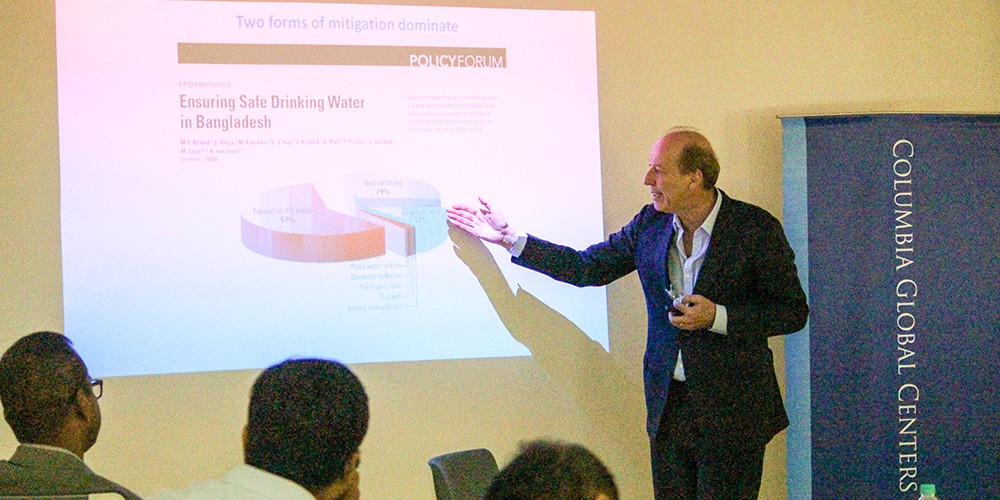Incentivizing Safe Drinking Water in Rural India

Arsenic contamination of groundwater has been recorded in more than 150 districts across 21 states in India and includes rural areas, where piped water supply is limited. Exposure to arsenic can inhibit intellectual development in children, cause severe skin lesions and even lead to fatal cardiovascular disease and cancers. Much of this risk, however, can be mitigated. According to Alexander Van Geen, Lamont Research Professor and member of the Earth Institute at Columbia University, “Arsenic contamination is highly localized. A neighbor might have a safe well, even when your well is affected.” So, it is possible to test all the wells in an area, identify unsafe wells, and accordingly educate and incentivize communities to use and share water only from safe wells.
As part of its ongoing work on Water Access and Management, Columbia Global Centers | Mumbai hosted a workshop on reducing exposure to unsafe drinking water in rural India, led by Professor Van Geen and Prabhat Barnwal, Assistant Professor of Economics, Michigan State University. It brought together experts from the Arsenic Knowledge and Action Network (AKAN), The Energy and Resources Institute, Sehgal Foundation, the Indian Institute of Technology Bombay (IIT Bombay) and the Institute of Chemical Technology, Mumbai.
Professor Van Geen has engaged in interdisciplinary research to promote large-scale environmental testing since two decades. One of his projects involved the testing of 50,000 wells in Bangladesh in communities affected by arsenic contamination. Based on the findings, 50 percent households switched to safer wells and significantly reduced their exposure. Arsenic mitigation initiatives in India have so far been marred by inadequate testing, covering government wells but not private wells. Sharing of water is restricted by social barriers such as caste and the cost of digging deeper wells that could provide arsenic-free water is prohibitive. In response, the two professors intend to introduce blanket testing of wells in two arsenic-affected states.
During the workshop, participants shared insights on designing financial and social incentives for testing and sharing of wells in affected Indian communities. “A project that involves water sharing practices would also have to factor in the access and use of non-well owners,” pointed out Manish Maskara, Coordinator, AKAN. According to NC Narayanan, Professor, IIT Bombay, studying the triggers that motivated community members to share their wells was also crucial to ensuring the sustainability of collective action projects. Participants also agreed on the importance of working with existing community institutions such as self-help groups or Panchayati Raj institutions to ensure and sustain community participation.
Other questions addressed during the workshop covered ownership of water resources and wells, and the role state agencies such as the Public Health and Engineering Department can play. The two professors will now explore the feasibility of piloting the project in Assam, West Bengal or Bihar.